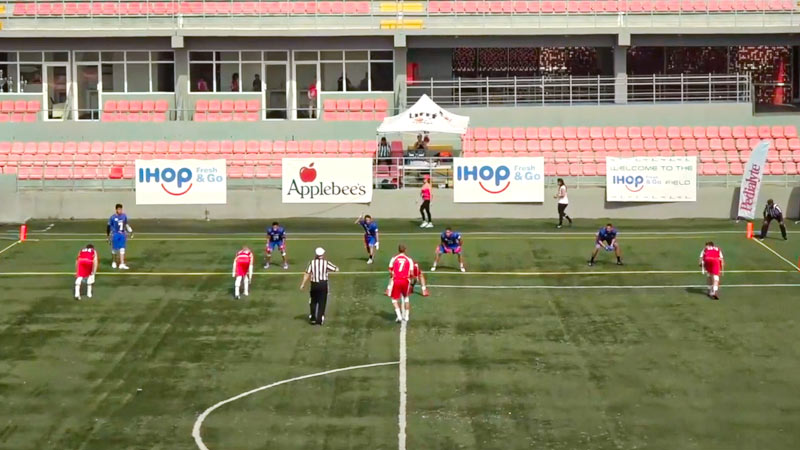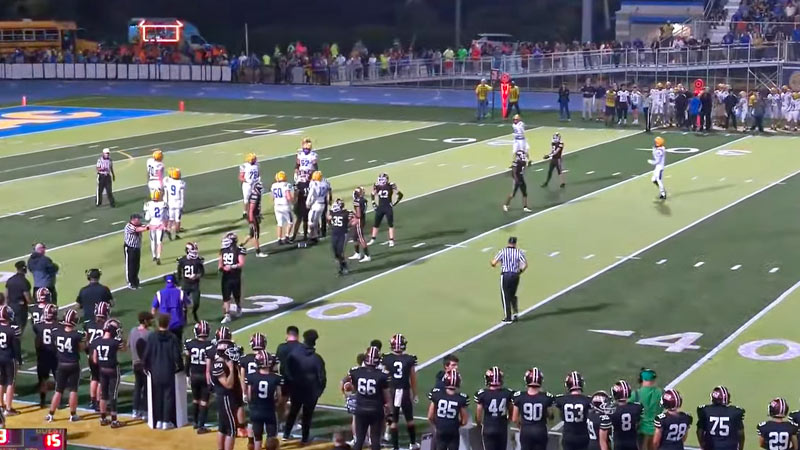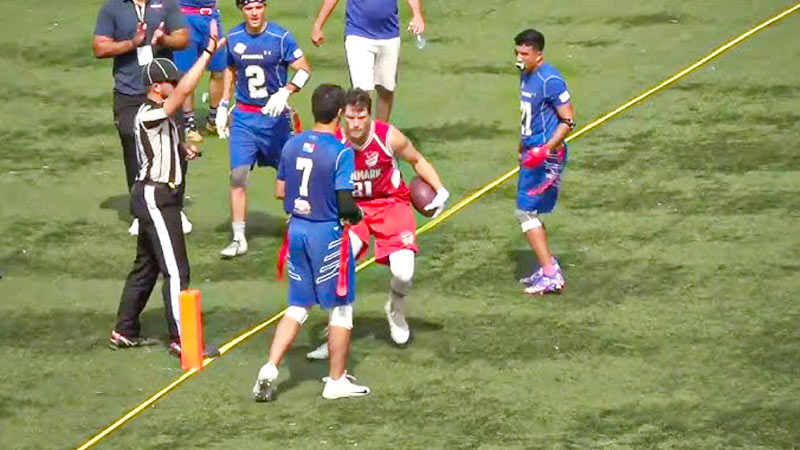In the dynamic world of American football, the Football Down Judge stands as a silent sentinel on the sideline, orchestrating the ebb and flow of the game. This unheralded official plays a pivotal role in maintaining fair play, enforcing rules, and ensuring the game’s smooth progression.
As an essential member of the officiating crew, the Down Judge’s responsibilities encompass everything from tracking downs and signaling plays to managing sideline decorum.
With their trained eye and unwavering focus, the Down Judge’s contributions influence the game’s outcome and the players’ experiences on the field. Let’s delve into some frequently asked questions about the Football Down Judge and gain insights into their impactful role. Stay focused.
Who Is the Football Down Judge?
In American football, the Down Judge is an important member of the officiating crew. Positioned on the sideline opposite the line judge, their primary responsibility is to manage the downs and assist the head referee with various aspects of the game.
The Down Judge helps track the number of downs, signals the beginning of each play, and monitors the sideline to ensure players and coaches remain within the designated area. They also work closely with the line judge to rule on out-of-bounds calls along the sideline.
Overall, the Down Judge plays a crucial role in maintaining the integrity of the game by ensuring fair play and enforcing the rules on their designated side of the field.
Responsibilities of Football Down Judge
The Football Down Judge, a vital part of the officiating crew in American football, holds several key responsibilities during a game:
Down Tracking
The Down Judge is responsible for keeping track of the current down, displaying the appropriate signal to indicate first, second, third, or fourth down to players, coaches, and spectators.
Play Clock Management
They assist the head referee in monitoring the play clock, ensuring that teams adhere to the time limits for snapping the ball.
Offside and Encroachment Calls
The Down Judge watches for offside and encroachment penalties by defensive players before the snap and signals any violations to the referee.
Offensive Motion and Shifts
They observe the offensive players’ motion and shifts before the snap to ensure they don’t cross the line of scrimmage too early.
Sideline Control
Monitoring the sideline, the Down Judge ensures that players, coaches, and staff remain within the designated coaching box and that the sideline remains orderly.
Out-of-Bounds Calls
Along with the line judge, they make judgment calls on plays near the sideline, determining if a player stepped out of bounds and when the ball is dead.
Assistance to Referee
The Down Judge aids the referee in making various calls, such as pass interference, illegal contact, and personal fouls that occur on their side of the field.
Clock Management
In some cases, they assist in timekeeping, helping to signal when the clock should start or stop based on the referee’s instructions.
Instant Replay
Depending on the league and level of play, the Down Judge might also be involved in discussing and reviewing certain plays using instant replay technology.
Communication
Effective communication with other officials, particularly the line judge, is crucial for consistent and accurate calls.
In essence, the Down Judge plays a critical role in ensuring the game proceeds smoothly, fairly, and within the rules, while also assisting the head referee and other officials as needed.
How to Be a Good Football Down Judge

Becoming a proficient Football Down Judge requires a combination of knowledge, skills, and dedication to the game. Here’s a guide on how to excel in this role:
Master the Rules
Gain a deep understanding of the football rules and regulations, especially those pertaining to the responsibilities of the Down Judge. This knowledge will enable you to make accurate calls and assist the rest of the officiating crew effectively.
Officiating Training
Attend officiating clinics, seminars, and workshops to enhance your knowledge of mechanics, positioning, and signal communication. Learn from experienced officials and stay updated on rule changes and interpretations.
Physical Fitness
Maintain good physical condition, as being an official requires agility and stamina to keep up with the fast-paced game. Stay fit through regular exercise and training.
Positioning
Understand the proper positioning on the field to get clear and unobstructed views of plays. Your position should allow you to judge offside calls, monitor the sideline, and make accurate out-of-bounds calls.
Communication
Develop strong communication skills to interact with other officials and players. Effective communication ensures everyone is on the same page, leading to consistent and accurate calls.
Decision-Making
Practice making split-second decisions, particularly when determining whether a player stepped out of bounds or if there was an infraction before the snap. Trust your judgment and confidence in making calls.
Sideline Control
Be assertive in maintaining order on the sideline, ensuring that coaches, players, and staff stay within their designated areas. Address any potential issues calmly and professionally.
Game Awareness
Stay focused and alert throughout the game. Anticipate potential situations and stay ready to respond promptly to any developments on your side of the field.
Collaboration
Work seamlessly with other officials, especially the line judge, to cover the entire field effectively. Effective teamwork contributes to consistent and accurate officiating.
Review and Feedback
After each game, review your performance and seek feedback from experienced officials or mentors. Identify areas for improvement and actively work on them.
Stay Calm Under Pressure
Football games can be intense, and emotions can run high. Develop the ability to remain calm and composed, even in challenging situations.
Continual Learning
The world of sports officiating is always evolving. Stay up-to-date with rule changes, mechanics improvements, and best practices through ongoing education.
Officiate Regularly
Gain experience by officiating games regularly, starting at lower levels and gradually progressing to more competitive games as your skills improve.
Respect and Professionalism
Maintain a high level of professionalism in your interactions with players, coaches, and fellow officials. Earn respect by being fair, consistent, and knowledgeable.
Passion for the Game
Develop a genuine love for the sport of football. Passion fuels your commitment to excellence and motivates you to continuously enhance your skills.
Remember that becoming a skilled Football Down Judge takes time and dedication. Embrace opportunities for growth, learn from your experiences, and continually strive to become the best official you can be.
Strategies to Be a Football Down Judge

Being an effective Football Down Judge requires a combination of strategies to ensure accurate calls, smooth game flow, and seamless collaboration with the officiating crew. Here are some strategies to consider:
Pre-Game Preparation
- Study the game roster and familiarize yourself with key players to anticipate potential actions on your side of the field.
- Review the specific rules and mechanics related to your responsibilities as a Down Judge.
- Communicate with fellow officials before the game to establish clear signals, positioning, and roles.
Positioning and Mechanics
- Position yourself on the sideline opposite the line judge, allowing a clear view of plays along your designated side of the field.
- Use proper mechanics for signaling downs, out-of-bounds plays, and offside/encroachment penalties.
- Maintain a consistent stance and posture to ensure accurate judgment and visibility.
Communication
- Maintain constant communication with the line judge, especially on plays near the sideline, to coordinate calls and avoid confusion.
- Signal effectively to players, coaches, and fellow officials to convey information clearly and confidently.
Play Awareness
Anticipate potential plays and actions, such as motion or shifts by the offense, and be ready to make accurate calls.
Sideline Management
- Enforce sideline boundaries, ensuring players, coaches, and staff remain within the designated areas to prevent interference with the game.
- Address any sideline issues calmly and assertively, using proper communication techniques.
Out-of-Bounds Calls
- Focus on the player’s position in relation to the sideline and the moment when they stepped out of bounds.
- Make timely and confident calls, and be prepared to offer explanations if necessary.
Offside and Encroachment Calls
- Watch for defensive players crossing the line of scrimmage before the snap, and signal violations clearly to the referee.
- Use your positioning to judge the line of scrimmage accurately.
Clock Management
Assist the referee in monitoring the play clock and ensuring that the game flows smoothly without unnecessary delays.
Instant Replay (if applicable)
If the instant replay is part of the officiating process, collaborate with the replay officials to provide input on reviewed plays.
Continuous Learning
Stay updated on rule changes and officiating techniques by attending clinics, workshops, and studying materials provided by officiating organizations.
Confidence and Composure
Develop a confident demeanor that demonstrates your authority on the field, but remains composed even in high-pressure situations.
Post-Game Review
- Reflect on your performance after each game, identifying areas of improvement and successes.
- Seek feedback from mentors or more experienced officials to refine your skills.
Adaptability
Be adaptable to different game scenarios, teams, and playing styles. Adjust your strategies as needed to effectively manage the game.
Remember that practice, experience, and continuous self-improvement are key to becoming a successful Football Down Judge.
Impact of Football Down Judge
The Football Down Judge has a significant impact on the game of American football through various contributions to fair play, game management, and rule enforcement. Their role influences several aspects of the game:
Game Flow and Timing
The Down Judge plays a crucial role in maintaining the pace of the game by assisting the head referee in monitoring the play clock and ensuring that teams adhere to the time limits for snapping the ball. This helps prevent unnecessary delays and keeps the game moving smoothly.
Down Tracking and Play Continuity
The Down Judge’s accurate tracking of downs ensures that teams have a fair opportunity to progress down the field within the designated number of attempts. This contributes to the strategic nature of the game and keeps play continuity intact.
Offside and Encroachment Enforcement
By closely watching the defensive line of scrimmage, the Down Judge helps prevent defensive players from gaining an unfair advantage by crossing the line before the snap. Their timely signals for offside and encroachment penalties maintain the integrity of the game.
Out-of-Bounds Calls
The Down Judge, along with the line judge, ensures that the ball and players remain within the boundaries of the field. Their accurate out-of-bounds calls impact field position, possession, and the overall progress of the game.
Sideline Control and Order
The Down Judge’s role in monitoring the sideline helps maintain order among players, coaches, and staff. This prevents sideline interference that could disrupt the game or lead to unsportsmanlike behavior.
Communication and Collaboration
Effective communication with fellow officials, especially the line judge, contributes to consistent and coordinated calls. The Down Judge’s collaboration enhances the accuracy of rulings and reduces the potential for missed calls.
Penalty Detection and Reporting
The Down Judge assists the head referee in identifying and reporting penalties that occur on their side of the field, such as pass interference or illegal contact. Their observations help enforce the rules and maintain a fair playing environment.
Instant Replay Input (if applicable)
In leagues that utilize instant replay, the Down Judge may contribute to the review process by offering insights and angles that aid in making correct calls on reviewed plays.
Integrity and Fairness
Ultimately, the Down Judge’s accurate judgments and adherence to the rules uphold the integrity and fairness of the game. Their contributions ensure that teams have an equal opportunity to compete within the rules and that the game’s outcome is determined by skill and strategy.
FAQs
What is the main responsibility of the Football Down Judge?
The primary responsibility of the Football Down Judge is to manage downs, signal the start of plays, and monitor the sideline’s order and player behavior.
How does the Down Judge assist in enforcing penalties?
The Down Judge assists the head referee by detecting penalties, such as offside or encroachment, on their designated side of the field and signaling them for appropriate action.
What role does the Down Judge play in out-of-bounds calls?
Alongside the line judge, the Down Judge judges whether a player has stepped out of bounds and contributes to accurate calls regarding the ball’s position relative to the sideline.
Is the Down Judge involved in instant replay reviews?
Depending on the league, the Down Judge may participate in discussions and provide input during instant replay reviews, contributing to the accurate resolution of disputed plays.
How does the Down Judge’s positioning impact its effectiveness?
Proper positioning is crucial for clear visibility and accurate judgment. The Down Judge’s sideline position allows them to assess plays on their designated side of the field.
Wrapping Up
As the heartbeat of fairness and order, the Football Down Judge’s contributions transcend the sidelines.
From managing downs to ensuring sideline decorum, their vigilance, and precision uphold the spirit of the game.
With an unwavering commitment to accuracy and integrity, the Down Judge embodies the essence of American football—a game where every call matters, and the seamless orchestration of play hinges on the silent expertise of these dedicated officials. Thank you so much.







